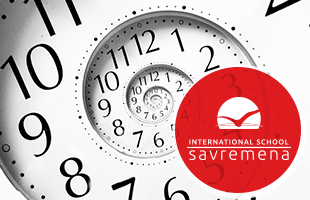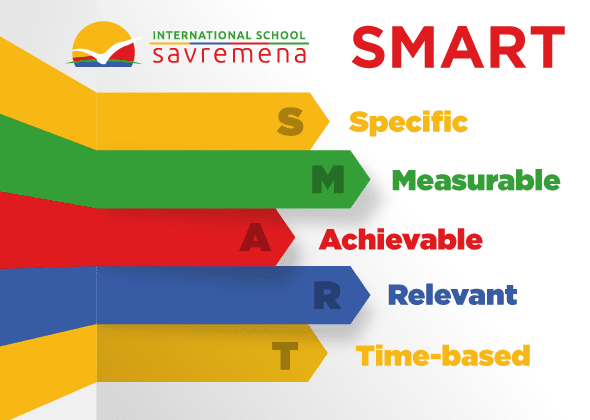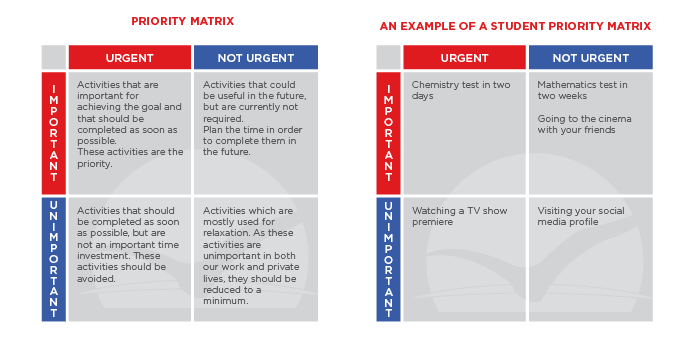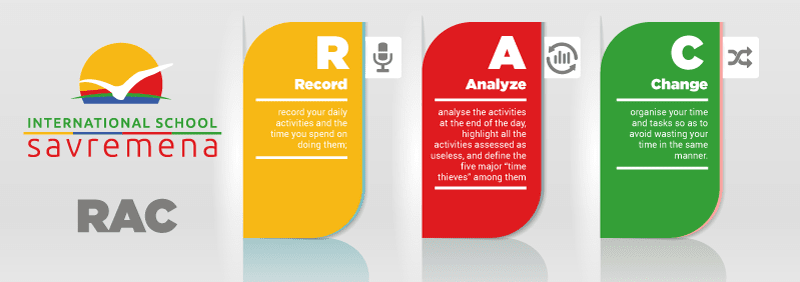
Do you think you’ve got too many obligations and too little time? In a world where competition is becoming more and more important, it is necessary to constantly work on improving your productivity. The business environment requires more work and reduced costs, which means a greater load, longer working hours and increased pressure for employees.
The speed in which information is spread and science and technology are developed, intensified globalisation and the reduced need for jobs affects both those who are already employed and those receiving their education, as requirements and competitiveness are constantly increasing. Taking into account the aforementioned facts, we assume that most people would give a positive answer to the initial question. However, the goal of this text is not to simply answer this question with a yes or a no.
The real question is: How can we manage to fulfil all our obligations while respecting deadlines, and still find time for ourselves and our loved ones?
The simplest answer is that we should work smarter, not work more.
Time management skills refer to knowing how to work “smarter”, by adopting and developing techniques to enhance the methods for selecting goals, approaching tasks, organising work and enduring in achieving the set goals. Research has shown that adopting time management techniques increases efficiency and productivity and reduces the tendency to procrastinate.
 Also, it has shown that it has a positive impact on creating a balance between business obligations and family life, which contributes to better health and a higher level of satisfaction with one’s job. Students who have better control over their time witness a much more positive evaluation of their work, a higher level of satisfaction with their lives, increased determination and a lower level of psychosomatic problems.
Also, it has shown that it has a positive impact on creating a balance between business obligations and family life, which contributes to better health and a higher level of satisfaction with one’s job. Students who have better control over their time witness a much more positive evaluation of their work, a higher level of satisfaction with their lives, increased determination and a lower level of psychosomatic problems.
Research has shown that students who manage their time more efficiently have significantly higher achievements during their education process. As teachers, you have a double responsibility: to organise your time so as to be productive, but satisfied, and to transfer time management skills to your students in order for them to be more successful and satisfied, and to improve the efficiency of your joint work.
Time management techniques
In order to efficiently manage our time, we need to learn how to set goals, identify priorities, plan our tasks, adequately evaluate our achievements and be persistent in achieving our goals.
1. Action planning
Don’t worry about your future, start planning it. Action planning is a process which helps us focus on important things and the necessary steps for achieving set goals. It represents the relation between set goals and available time. In the broadest sense, in includes a clear (SMART) definition of a goal and its division into particular actions that will lead to its implementation.
When achieving set goals, it is necessary to define the goal in a “smart” way. This refers to the SMART acronym in English:
S (specific) – the goal should be defined in an accurate, clear and concise manner.
M (measurable) – the goal should have a measurable result, i.e. one must define it in a way which enables one to establish the level of achievement.
A (attainable) – in order to achieve it, we should define an attainable goal.
R (realistic; resource bond) – the goal should be realistic, i.e. in accordance with our resources and possibilities.
T (timely) – it is necessary to define the deadline for a goal.
So, in order to achieve a set goal, we need to define it adequately, and in order for the goal to be realistic and attainable, we need to assess objectively our current situation and goals, as well as the actions that will lead to their implementation. Also, no matter how realistic and attainable the plans and actions may seem, it is always good to have a backup plan or additional activities that may help us achieve the set goal, provided we encounter some difficulties that cannot be foreseen when defining the goal.
An example of a SMART goal for students: I want to have excellent achievements and my goal is to have a 4,50 GPA at the end of the school year.
2. Dividing a goal into smaller goals
If you divide a set goal into smaller goals, i.e. tasks defined by more specific tasks that will contribute to the implementation of the goal, you will have clearer insight into the priorities, organise your time more accurately and enable yourself to assess the progress more objectively, thus facilitating the process of making decisions and defining the subsequent steps.
An example in goal division: In order to have a 4.50 average mark, I need to improve my mathematics mark to 4, my biology mark to 5, physics to 4, obtain another 5 in Serbian, etc.
When dividing your goals to specific tasks, it is necessary to clearly assess your strengths and weaknesses. By clearly defining the obligations that will lead us towards our goal, we will be able to evaluate the possibility to achieve the set goal more accurately and objectively, i.e. we will know what marks are attainable in particular subjects (by taking into account our previous marks and knowledge in a subject, the oral exam and written test schedule, etc.) and how much effort we need to invest in specific subjects in order to achieve the set goals.
3. Defining priorities
Efficiency and effectiveness are not the same. Efficiency means working in an adequate, quick and high-quality manner, while effectiveness means working on the right thing. How do we define what the “right thing” is?
The right thing refers to urgent and important things. If we work diligently on irrelevant tasks, we are efficient, but not effective, since our results will not bring us closer to achieving the set goal.
We can, therefore, say that we have wasted time and effort, despite having completed a task. If we list the tasks we should complete, or wish to complete, and arrange them in relation to their importance and urgency, we will avoid the trap of wasting time and energy on irrelevant or currently less important obligations.
4. Writing to-do lists
 Writing to-do lists can significantly help you organise your time and avoid forgetting tasks. There is a proverb that says a smart man writes things down, and the not so smart man memorizes them.
Writing to-do lists can significantly help you organise your time and avoid forgetting tasks. There is a proverb that says a smart man writes things down, and the not so smart man memorizes them.
If we add to this the fact that modern technology provides us with the possibility to organise our time on all portable devices, and that there are numerous apps enabling us to efficiently update our obligations and remind us of them, you fail to find a sensible excuse for not making to-do lists, being late or forgetting about your obligations.
On the other hand, if you are creative and nothing can replace the feeling of tearing or crossing a completed task, use your imagination and organise your tasks on a list you will design in a manner that will motivate you and guide you towards the activities that will enable you to achieve your goal.
Some of the advantages of using a to-do list:
- Focusing on important things.
- Minimising the possibility to overlook an obligation.
- Helps you organise your thoughts.
- Helps you see the wider picture.
- Relieves you of having to memorise information.
- Saves time.
- Helps you define priorities.
- Provides you with a subjective sense of having greater control over your time.
- Provides you with the option to monitor achieved tasks.
5. A win over procrastination
Procrastination may be caused by fear of failure, perfectionism, lack of self-control, the inability to hold off current urges, inadequate activity plans or by our habit to underestimate the time we require to complete an activity.
Regardless of the reason behind it, procrastination refers to the avoidance of tasks. There are various pieces of advice as to how to avoid procrastination: securing conditions where nothing distracts us, activity plans, visualising success, scheduled time for performing specific activities and so on. However, the most effective way to fight procrastination is to simply start an activity.
Although it may seem difficult and time consuming at the beginning, once you overcome the initial resistance, respondents who have participated in studies on procrastination have said that tasks seemed more difficult and tiresome until they started performing them and that subsequently, they found it easier to focus on solving a problem or perform an activity.
In order to reduce the possibility of procrastination and “time thieves”, i.e. performing unimportant tasks and those that aren’t urgent, it is useful to abide by the RAC method for monitoring activities:
R (Record) – record your daily activities and the time you spend on doing them;
A (Analyse) – analyse the activities at the end of the day, highlight all the activities assessed as useless, and define the five major “time thieves” among them;
C (Change) – organise your time and tasks so as to avoid wasting your time in the same manner.
This method provides you with the option to gain direct and objective insight into the way we manage our time. People often underestimate the amount of time they spend doing trivial things that steal the time they would otherwise spend on doing their tasks.
Take a look at a video about procrastination.
6. Final reward
Last but not least, we should clearly define our reward after completing the tasks that lead us towards our goal. Although the goal itself is a reward, in order to endure working towards our goal, we need to provide ourselves with an incentive in the form of a reward for having completed the required tasks.
It’s important to clearly define when and how you will reward yourself. Choose wisely what the reward will be and do not be modest, particularly when completing challenging tasks. Apart from helping you endure in your task, these rewards help you assess progress and motivate you to start a new task.
Author: Milana Jovanov
Literature:
- Action Planning, (2016). Kent.ac.uk. Retrieved 28 April 2016, from https://www.kent.ac.uk/careers/sk/skillsactionplanning.htm
- Adams, G. A, & Jex, S. M. (1999). Relationships between time management, control, work–family conflict, and strain. Journal of occupational health psychology, 4(1), 72.
- Britton, B. K, & Tesser, A. (1991). Effects of time-management practices on college grades. Journal of educational psychology, 83(3), 405.
- Eerde, W. V. (2003). Procrastination at work and time management training.The Journal of psychology, 137(5), 421-434.
- Green, P, & Skinner, D. (2005). Does time management training work? An evaluation. International Journal of Training and Development, 9(2), 124-139.
- How to manage your time effectively. (2016). Kent.ac.uk. Retrieved 28 April 2016, from https://www.kent.ac.uk/careers/sk/time.htm
- Macan, T. H, Shahani, C, Dipboye, R. L, & Phillips, A. P. (1990). College students' time management: Correlations with academic performance and stress. Journal of educational psychology, 82(4), 760.





















